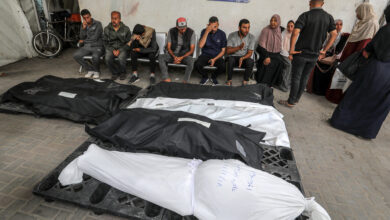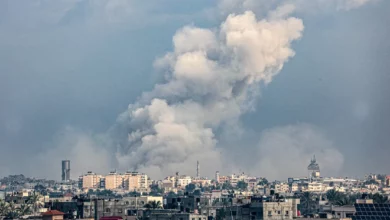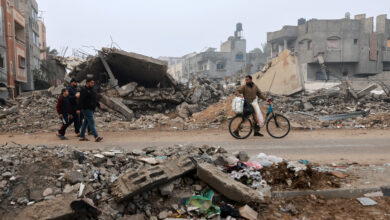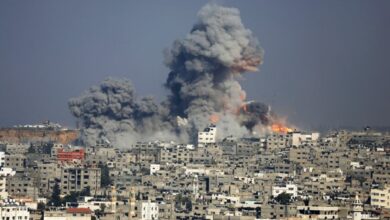One year after Israel struck the Gaza Strip, the Islamic resistant group Hamas, which continues to govern the enclave, remains defiant and in full control, rebuilding its strength and shrugging off criticism from Palestinian opposition. A new interior minister has replaced the man Israel assassinated during its three-week offensive, and new police units have been formed to make up for those killed by Israeli bombs in the opening air strikes of the war.
"When I took this post I knew my chances of being killed would increase, but that’s the risk we take," Interior Minister Fathi Hammad told Reuters in an interview at his home. Hammad said his priority was to ensure internal order, fight crime and rebuild the security institutions destroyed during the Israeli bombings that killed 350 policemen and demolished 60 buildings. Hammad said 350 new recruits were added to the police force and a damaged building had been fixed up for them. "We have not yet made up for the loss of equipment, weapons and cars," said Hammad.
One year on, there are still sporadic exchanges of gunfire at the border between Gaza and Israel. Some Israelis say former Prime Minister Ehud Olmert, who launched the offensive on December 27 2008, called it off too soon, leaving the operation unconcluded and Hamas claiming victory. Olmert’s centrists narrowly lost a spring election to Benjamin Netanyahu, a rightwinger who vowed to take a hard line if the Islamists resumed firing rockets into Israel. While rarely lethal and often missing their targets, the rockets reportedly terrorize southern Israeli towns and cities.
Hamas is backed by Iran, and Hammad said it gets no help from Arab governments, which "follow the international line which is to isolate and boycott the Gaza Strip." Hamas’ critics claim the group violates civil rights and represses political expression. Many human rights activists say it is trying to impose Islamic law on the community. "There is an Islamist movement in power here, and it seeks to reflect that on our political and social systems," says women’s right activist Zainab Al-Ghonaimi. "Unfortunately, its particular view of things has continued and where there is no plurality, there is no democracy," says the veteran lawyer.
Complaints by human rights groups overcame attempts by some Hamas officials this year to impose head covering on schoolgirls and female lawyers. But Ghonaimi says female government employees are forced to cover their hair. Rabah Mhana, a senior leader of the Popular Front for the Liberation of Palestine (PFLP), says Hamas’ reputation has been damaged. "Hamas made big mistakes both in governance and in handling political issues, and those mistakes must have an impact," says Mhana, who recently accused Hamas security forces of preventing PFLP gunmen from firing rockets into Israel. Incessant rocket fire by Gazan militant groups under the aegis of Hamas was Israel’s stated reason for its offensive last year, codenamed Operation Cast Lead. Hamas refuses to recognize Israel or abandon armed resistance, but says it would conclude a truce with the Jewish state.
It denies trying to stop other groups fighting Israeli forces around Gaza, which is under a tight blockade, but appears to have won an agreement to limit rocket fire. Hammad denied any harassment of political opponents and invited human rights representatives to visit prisons to prove that "we have no political detainees at all." The Islamists’ embittered rival Fatah, the dominant Palestinian movement in the West Bank, says its Gaza members are oppressed. Hamas makes the same charges against Fatah in the West Bank. On Saturday Human Rights Watch accused Israel and Hamas of failing to take punitive measures against members of their own forces accused of atrocities during Israel’s strike on Gaza.
In a statement, the New York-based rights group also criticised Israel’s blockade of Gaza, which "created massive humanitarian need and prevented the reconstruction of schools and homes" in the coastal strip. "Both Israel and Hamas have failed to punish those responsible for serious violations during the fighting," Fred Abrahams, HRW senior emergencies researcher, said in the statement. "Some rocket attacks continue and the Israeli blockade of Gaza has prevented basic reconstruction. The only things getting built in Gaza are desperation and despair," he added. Human Rights Watch accused Israel of "drone-launched missile attacks that killed 29 civilians, the killing of 11 civilians holding white flags, and the use of white phosphorus munitions in densely populated areas."
It said the Jewish state’s forces also destroyed many unjustified civilian targets including farms, factories and much of Gaza’s water and sanitation network, and that most of them still remain unrepaired. Hamas and other armed Palestinian groups were accused of firing hundreds of rockets into populated areas of Israel, and using the 22-day war as an excuse to kill and torture political rivals. "Israel has so far punished only one soldier, a sergeant, for wartime abuse, sentencing him to seven and a half months in prison for stealing a credit card," said the statement. "Human Rights Watch does not know of any investigations by Hamas authorities in Gaza into laws-of-war or human rights violations during the fighting." An estimated 1,400 Palestinians and 13 Israelis were killed in last year’s war.
Thousands of Gazan homes, factories and businesses were destroyed by bombing and shelling. The $5 billion international aid pledged for reconstructing Gaza 10 months ago remains on paper only. While Hamas and Fatah remain at loggerheads, donor countries are unsure how to channel the funds to Gaza, and the Israeli blockade imposes severe restrictions on building materials that could be used for military purposes. "I am replanting my land which was razed by the invasion. I’ve planted date trees, lemons and oranges. Like the trees we will remain implanted in our land and we will never abandon it," says Issa Hamouda, whose home was destroyed in the land assault. "Hamas gets more popular every day. Whether there is reconstruction aid or not we will build our houses brick by brick," says the old man.
But Ghaleya el-Samouni, who lost 29 members of her extended family in the offensive, said the situation was grim and survivors were left without help. "[Wether it’s] Hamas or Fatah, they are all illusions. Nobody is standing with the people," she says. Gazans cling to the fading hope that Hamas and Fatah will end their feud so reconstruction can begin. "I have not seen any progress since the war. Everything is at a standstill. I hope for national reconciliation and the reconstruction of our homes," says 25-year-old Mohamed Darduna, whose home was destroyed in January. Dalal Abu Aisha, 15, lost her parents and three siblings when an Israeli missile hit their house. "I have no one to study with and I have no one to play with," says the young girl who now lives with her grandfather.




